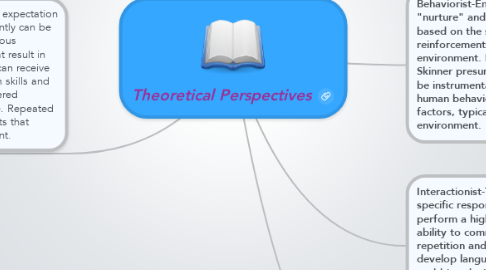Theoretical Perspectives
by Sharon Woodruff


1. Cognitive Developmental-The expectation of a child developing intelligently can be obtain through the use of various techniques and sequences that result in accepable behavior. children can receive training and discipline through skills and abilities gained by a well nurtered childhood learning experience. Repeated exposure to objects and events that reinforce cognitive deveopment.
1.1. Piaget
1.1.1. Nature
2. Behaviorist-Emphasizes the role of "nurture" and considers learning to occur based on the stimuli, respones, and reinforcements that occur in the environment. Reward theory, according to Skinner presumes positive reinforcement to be instrumental. Skinner proposes that human behavior can be motivated by factors, typically rewards in an individual 's environment.
2.1. Skinner
2.1.1. Nurture
3. Interactionist-This perspective identifies specific respones to children's efforts to perform a higher mental function. The ability to communicate results from repetition and reward. As a child's self develop language becomes an attention grabbing device. The interactionist perspective allows a child to further engage in a social atmosphere.
3.1. Vygotsky
3.1.1. Nurture
4. Nativist-There is a property of language development that begins with the infant cries, gurgles, and mouthing sounds. The nativist perspective has a unique common aspect of early language development, in that its relationship between syntactic and semantic learning form the building block for grammar. Pronunciation and vocalulary are key elements of the nativist perspective because they introduce early language learners to more developed or demanding properties of human language.
4.1. Chomsky
4.1.1. Nature
